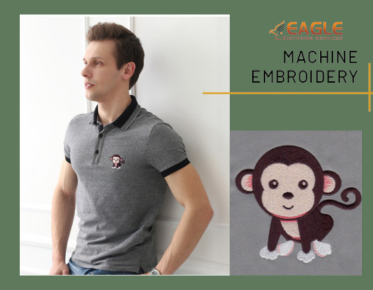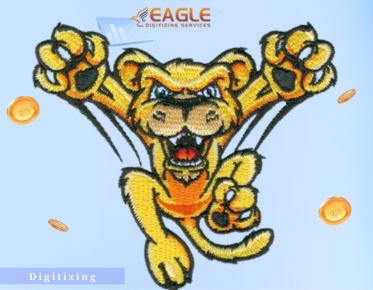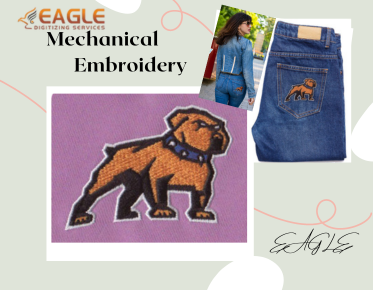Supplier Search: Navigating Embroidery & Vector Art
Choosing the right embroidery digitizing
and vector art design supplier is a crucial
decision for any business involved in custom apparel, promotional products, or
personalized gifts. The right supplier can significantly impact your
efficiency, product quality, and overall customer satisfaction. This guide will
help you navigate the process of selecting a supplier that meets your specific
needs and sets you up for success.
Why
Choosing the Right Supplier Matters
The Impact of Quality Suppliers
on Your Business
A quality supplier doesn't just provide a service; they become a critical
partner in your business. The right supplier ensures that your designs are
executed flawlessly, which enhances your product offerings and builds your
brand's reputation. Conversely, a subpar supplier can lead to delays,
poor-quality products, and frustrated customers, all of which can harm your
business.
Understanding
Your Needs
Identifying Your Specific
Requirements
Before you start your search, it's essential to understand what you
need from a supplier. Consider the types of designs you require, the volume of
orders, the complexity of your projects, and any specific technical
requirements you might have.
Prioritizing Features and
Services
Once you've identified your needs, prioritize the features and
services that are most important to you. These might include turnaround times,
customization capabilities, pricing structures, or sustainability practices.
Researching
Potential Suppliers
Where to Look for Reliable
Suppliers
Start by searching online directories, industry forums, and trade
associations. Networking with other businesses in your industry can also
provide valuable referrals.
Evaluating Online Reviews and
Testimonials
Look at reviews and testimonials on platforms like Google, Yelp, or industry-specific sites. Pay attention to feedback about quality, reliability, and customer service.
Assessing
Supplier Experience and Expertise
Years in the Industry: Does It
Matter?
While newer companies can be innovative, established suppliers often
have more refined processes and a track record of reliability. Consider a
supplier's longevity as a factor in your decision.
Specialization in Embroidery
Digitizing and Vector Art
A supplier that specializes in embroidery digitizing and vector art will have deeper expertise and can offer
more nuanced advice and higher-quality services.
Evaluating
Quality of Work
Requesting Samples and
Portfolios
Always request samples or view portfolios to assess the quality of a
supplier’s work. Look for precision, attention to detail, and consistency in
their designs.
Understanding the Supplier's
Design Process
Ask potential suppliers to explain their design process. A
transparent, well-documented process is a good indicator of professionalism and
reliability.
Assessing
Technology and Tools Used
Importance of Modern Software
and Equipment
Suppliers using the latest software and equipment are more likely to
produce high-quality work efficiently. Ensure they use industry-standard tools
that are compatible with your needs.
Compatibility with Your Existing
Systems
Check if the supplier's technology is compatible with your existing
systems to avoid integration issues that could disrupt your workflow.
Turnaround
Time and Efficiency
Understanding Standard Lead
Times
Ask about standard lead times for typical orders and ensure they align
with your business needs. Fast turnaround is crucial in meeting customer
expectations.
How Suppliers Handle Rush Orders
Find out how suppliers handle rush orders or unexpected spikes in
demand. Their flexibility can be a significant asset during peak periods.
Pricing
and Value
Comparing Pricing Models
Compare pricing models among different suppliers. Some might offer
flat rates, while others charge based on complexity or volume.
Balancing Cost with Quality
Cheaper isn't always better. Balance cost with the quality of work to
ensure you're getting the best value for your money.
Customer
Service and Support
Availability of Support Channels
Good customer service is essential. Ensure the supplier offers
multiple support channels and has a reputation for responsiveness.
Response Time and Problem
Resolution
Evaluate their response time and how they handle issues. Prompt,
effective problem resolution is a hallmark of a reliable supplier.
Customization
Capabilities
Ability to Handle Unique and
Complex Designs
Ensure the supplier can handle unique and complex designs. Their
ability to customize is crucial for offering distinctive products.
Flexibility in Meeting Your
Specific Needs
A flexible supplier can adapt to your specific needs, providing tailored solutions that enhance your product offerings.
Scalability
and Growth
Can the Supplier Grow with Your
Business?
Consider whether the supplier can scale their services as your
business grows. They should be able to handle increased order volumes without
compromising quality.
Handling Large Volume Orders
Assess their capacity to manage large volume orders, especially if you
anticipate significant business growth.
Geographic
Location and Logistics
Local vs. International Suppliers
Decide whether you prefer a local supplier for ease of communication
and faster shipping, or if international suppliers offer better terms or
expertise.
Impact of Shipping Costs and
Time
Consider the impact of shipping costs and time on your overall costs
and turnaround times. Proximity can sometimes lead to significant savings and
quicker deliveries.
Sustainability
Practices
Supplier Commitment to
Eco-Friendly Practices
Sustainability is becoming increasingly important. Choose suppliers
committed to eco-friendly practices, which can also enhance your brand's
reputation.
Impact on Your Brand’s
Sustainability Goals
Aligning with suppliers who share your sustainability goals can
strengthen your brand’s commitment to the environment, appealing to
eco-conscious customers.
Client
References and Case Studies
Speaking Directly to Current and
Past Clients
Talking to current and past clients can provide insights into a
supplier’s reliability and quality. Ask about their experiences and any
challenges they faced.
Learning from Supplier Success
Stories
Review case studies to understand how the supplier has helped other
businesses succeed. These stories can provide reassurance about their
capabilities and expertise.
Trial
Period and Testing
Negotiating a Trial Run
Negotiate a trial period with potential suppliers to evaluate their
performance. This allows you to assess their quality, reliability, and
compatibility with your business.
Evaluating Performance During
the Test Period
During the trial period, closely monitor the supplier's performance.
Assess their quality, turnaround time, communication, and overall service.
Contract
Terms and Negotiation
Key Contract Clauses to Look For
Pay attention to key contract clauses, such as confidentiality,
turnaround times, quality guarantees, and payment terms. Ensure they protect
your interests.
Tips for Successful Negotiation
Be clear about your needs and expectations. Successful negotiation
involves finding a balance that satisfies both parties, fostering a long-term
partnership.
Integration
with Your Workflow
Ensuring Smooth Onboarding
Ensure the supplier can integrate smoothly into your workflow.
Effective onboarding processes minimize disruption and set the stage for a
productive relationship.
Training and Support for Your
Team
Evaluate the training and support the supplier provides for your team.
Adequate support ensures your staff can effectively use the supplier’s services
and tools.
Long-Term
Partnership Potential
Building a Strong Relationship
Focus on building a strong, collaborative relationship with your
supplier. Open communication and mutual respect lead to long-term success.
Adapting to Future Needs and
Trends
Choose a supplier that stays ahead of industry trends and is willing to adapt to your future needs. Their ability to innovate can keep your business competitive.
Red
Flags to Watch Out For
Poor Communication
●
Lack of Prompt and Clear Communication Channels:
Effective communication is the cornerstone of any successful partnership. A
supplier that lacks clear and accessible communication channels may lead to
misunderstandings, delays, and frustration on both sides.
●
Unresponsiveness to Inquiries or Concerns: A
responsive supplier acknowledges inquiries and concerns promptly, demonstrating
professionalism and commitment to customer satisfaction. Conversely, consistent
unresponsiveness signals a lack of accountability and may indicate future
communication challenges.
Inconsistent Quality of Work
●
Significant Discrepancies in Sample and Finished
Products: A reputable supplier maintains consistency between sample designs and
finished products, ensuring that client expectations are met. Significant
discrepancies in quality or execution raise concerns about the supplier's
attention to detail and craftsmanship.
●
Frequent Errors or Flaws in Designs: Repeated
errors or flaws in designs suggest underlying issues with the supplier's
processes or expertise. Consistent quality control measures should be in place
to minimize errors and ensure the delivery of flawless products.
Limited Portfolio or Lack of
Samples
●
Sparse or Incomplete Portfolio Showcase: A
comprehensive portfolio showcases a supplier's capabilities, expertise, and
versatility. A sparse or incomplete portfolio may indicate limited experience
or a lack of proficiency in handling diverse projects.
●
Inability to Provide Samples Upon Request: The
ability to provide samples upon request demonstrates a supplier's confidence in
their work and willingness to showcase their capabilities. An inability or
reluctance to provide samples may raise doubts about the supplier's competence
or the quality of their work.
Lack of Transparency
●
Vague Pricing Structure or Hidden Fees:
Transparency in pricing is critical for establishing trust and managing
expectations. A supplier with a vague pricing structure or hidden fees may lead
to budgetary surprises and strained client relationships.
●
Unclear Terms and Conditions in Contracts:
Contracts should clearly outline the scope of work, project timelines, payment
terms, and other relevant details. Unclear or ambiguous terms and conditions
may result in disputes or misunderstandings during the course of the project.
Unreliable Turnaround Times
●
Consistently Missing Deadlines: Meeting deadlines
is essential for project success and client satisfaction. A supplier that
consistently misses deadlines may disrupt project schedules, leading to delays
in delivery and potential financial losses for clients.
●
Inability to Handle Rush Orders or Volume
Projects: Flexibility and scalability are essential qualities in a supplier,
particularly when it comes to accommodating rush orders or large-volume
projects. An inability to handle increased workload may indicate capacity
constraints or inefficiencies in production processes.
Inadequate Production Capacity
●
Insufficient Resources to Handle Client Demands:
A supplier's production capacity should align with client demands to ensure
timely delivery and quality outcomes. Insufficient resources, such as manpower
or equipment, may lead to bottlenecks and production delays.
●
Inconsistencies in Output Quality Due to
Overload: Overloading production capacity can compromise the quality of output,
leading to inconsistencies or errors in finished products. A supplier should
maintain a balanced workload to uphold quality standards and meet client
expectations.
Questionable Reputation or
Reviews
●
Poor Ratings or Reviews on Online Platforms:
Online ratings and reviews serve as a barometer of a supplier's reputation and
credibility. Poor ratings or negative reviews on online platforms may signal
dissatisfaction among clients and warrant further investigation.
●
Reports of Unethical Business Practices: Reports
of unethical business practices, such as dishonesty, fraud, or breach of
contract, raise serious red flags and warrant immediate attention. Trustworthy
suppliers operate with integrity and transparency in all their dealings.
Limited or Unverifiable
Experience
●
Newly Established Business with a Limited Track
Record: While new businesses deserve a chance to prove themselves, a newly
established supplier with a limited track record may lack the experience or
stability needed to deliver consistent results. Established suppliers with a
proven track record offer greater assurance of reliability and quality.
●
Lack of Industry Experience or Specialization:
Industry-specific knowledge and expertise are invaluable assets in supplier
selection. A supplier that lacks experience or specialization in embroidery
digitizing and vector art design may struggle to understand client requirements
or deliver satisfactory outcomes.
Inconsistent Availability or
Accessibility
●
Frequent Changes in Contact Information:
Consistency in contact information is essential for maintaining open
communication channels with clients. Frequent changes in contact information
may disrupt communication and lead to delays or missed opportunities.
●
Difficulty Reaching Supplier via Phone or Email:
Accessibility is key to effective communication and collaboration. Difficulty
reaching a supplier via phone or email may indicate poor responsiveness or lack
of commitment to client needs.
Final
Decision-Making
Weighing Pros and Cons of Top
Contenders
List the pros and cons of your top contenders. Consider factors like
quality, cost, turnaround time, and customer service to make an informed
decision.
Making an Informed Choice
Use all the information gathered to make a well-informed choice. The
right supplier should align with your business needs, goals, and values.
Choosing the right embroidery digitising in USA and vector art design supplier is vital for your
business's success. Invest time in thorough research and evaluation to find a
supplier that meets your needs and helps you achieve your business goals.
Building a strong partnership with the right supplier can lead to long-term
success and a competitive edge in the market.



